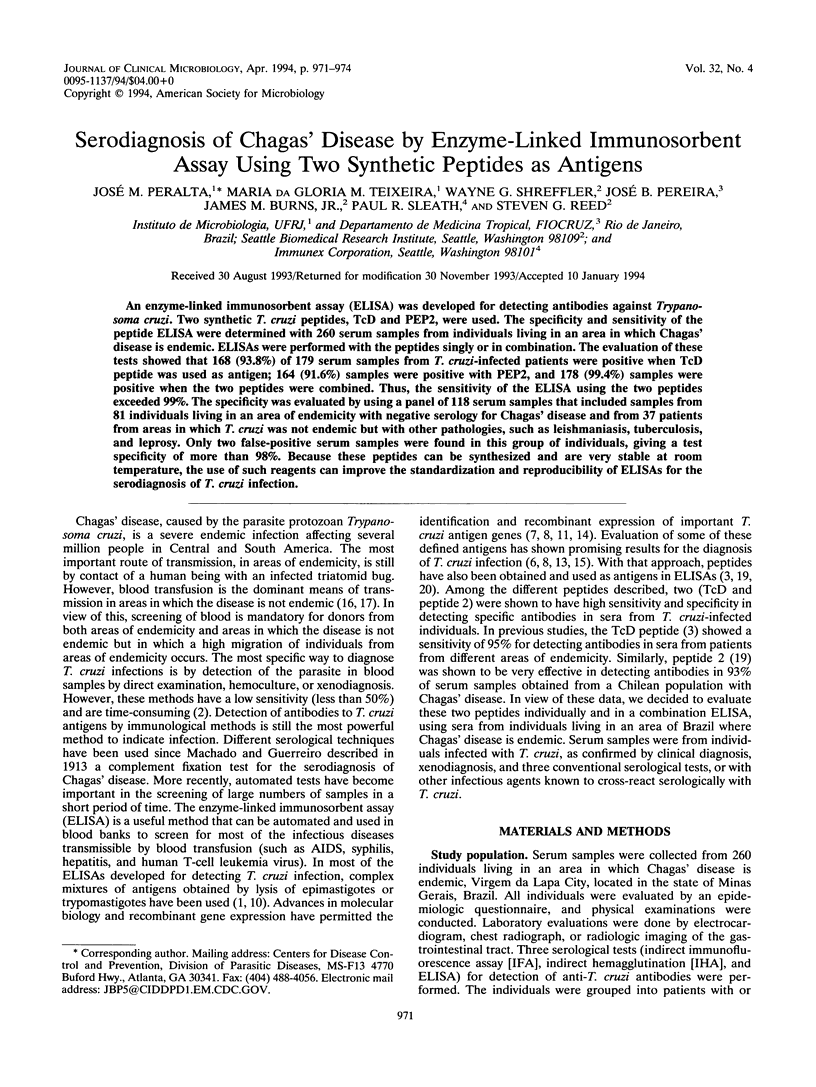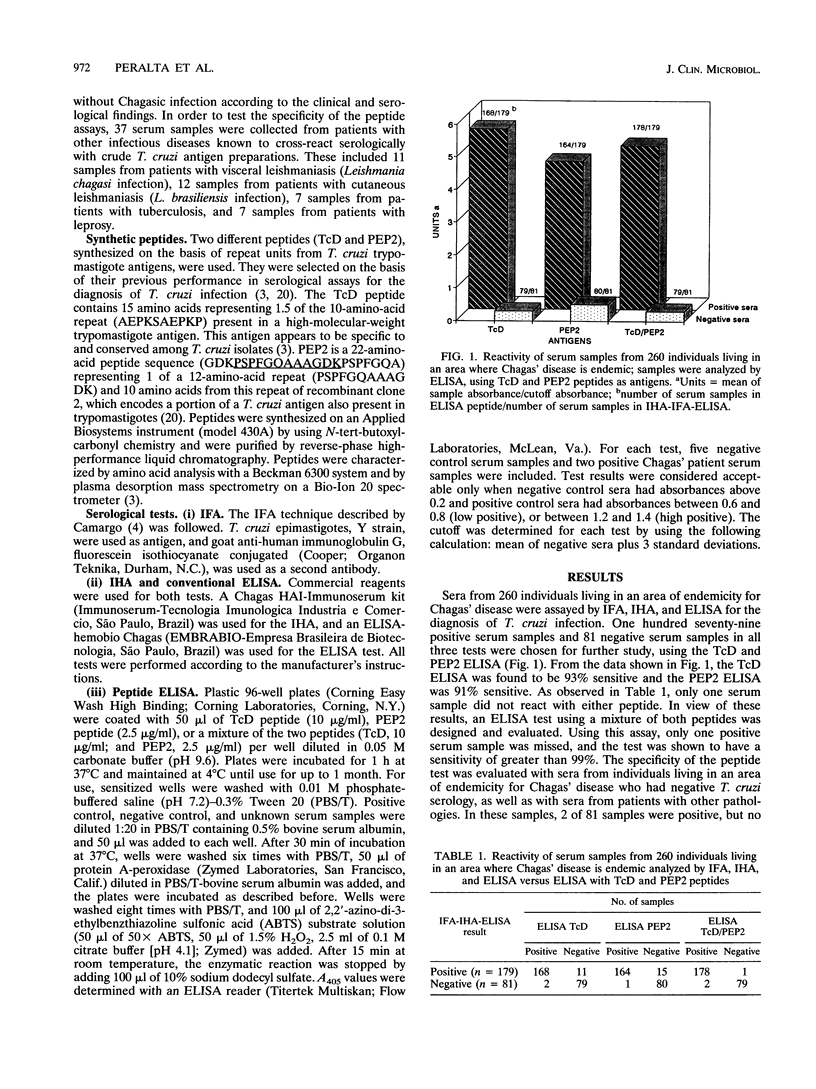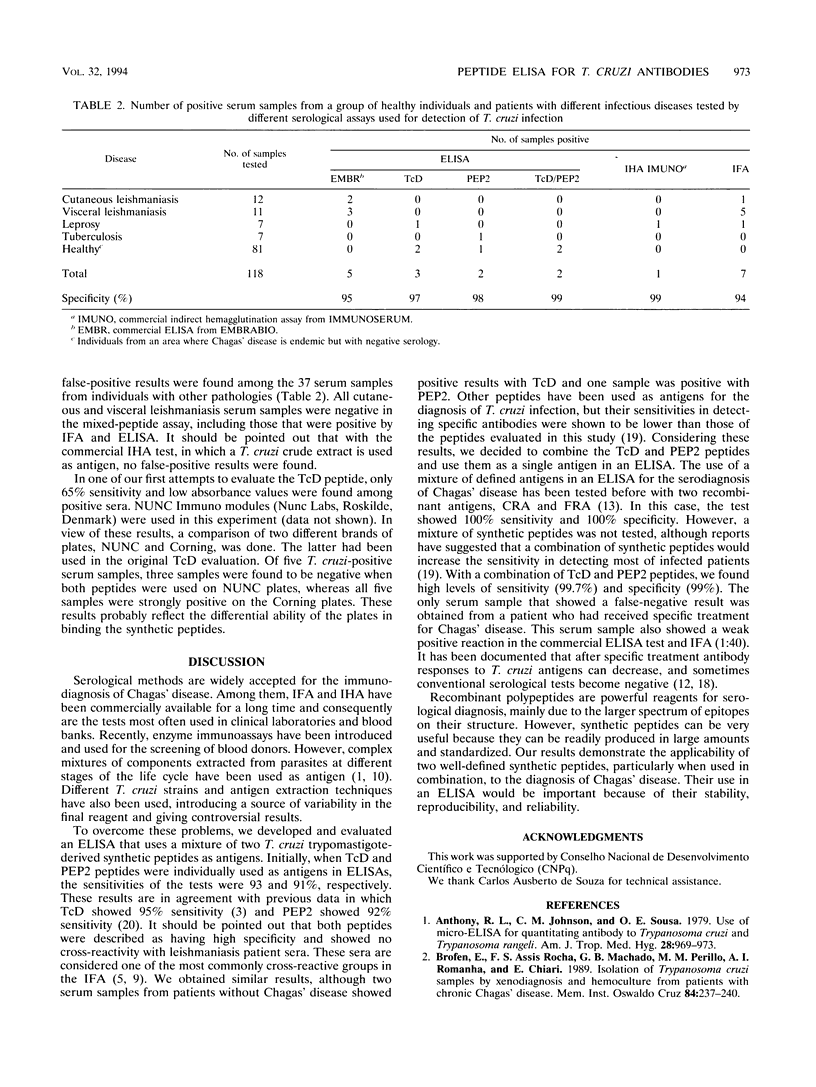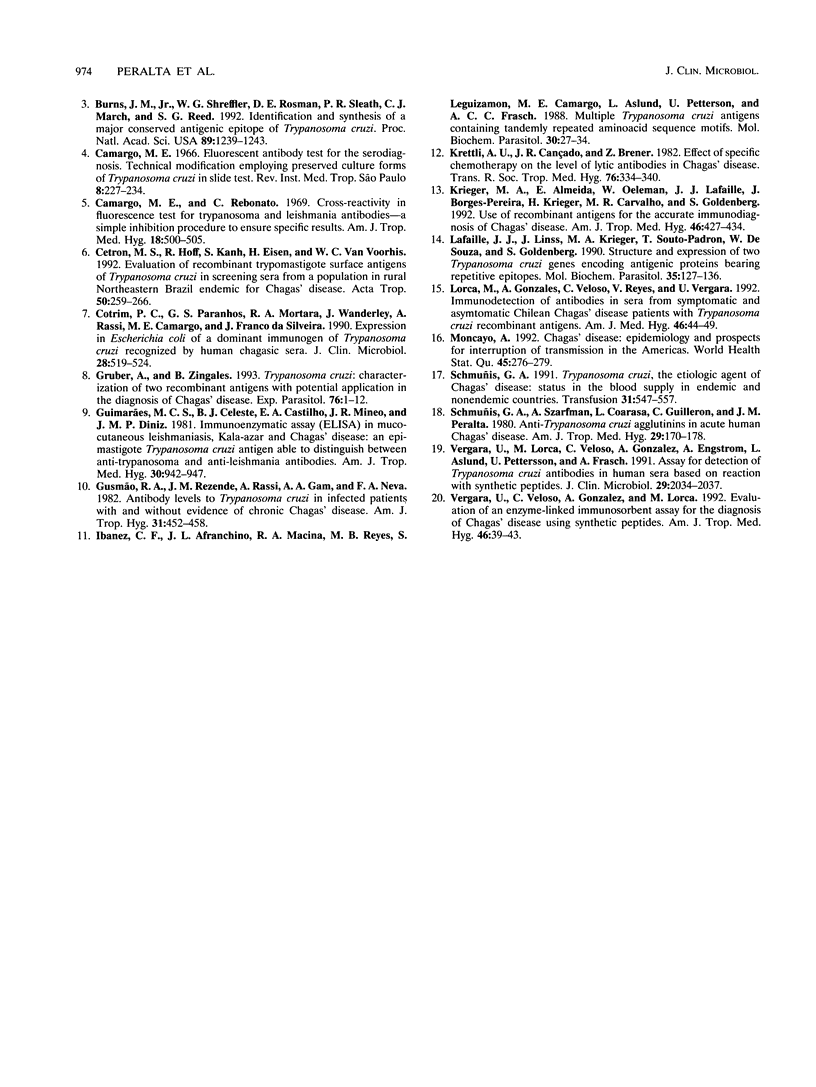Abstract
An enzyme-linked immunosorbent assay (ELISA) was developed for detecting antibodies against Trypanosoma cruzi. Two synthetic T. cruzi peptides, TcD and PEP2, were used. The specificity and sensitivity of the peptide ELISA were determined with 260 serum samples from individuals living in an area in which Chagas' disease is endemic. ELISAs were performed with the peptides singly or in combination. The evaluation of these tests showed that 168 (93.8%) of 179 serum samples from T. cruzi-infected patients were positive when TcD peptide was used as antigen; 164 (91.6%) samples were positive with PEP2, and 178 (99.4%) samples were positive when the two peptides were combined. Thus, the sensitivity of the ELISA using the two peptides exceeded 99%. The specificity was evaluated by using a panel of 118 serum samples that included samples from 81 individuals living in an area of endemicity with negative serology for Chagas' disease and from 37 patients from areas in which T. cruzi was not endemic but with other pathologies, such as leishmaniasis, tuberculosis, and leprosy. Only two false-positive serum samples were found in this group of individuals, giving a test specificity of more than 98%. Because these peptides can be synthesized and are very stable at room temperature, the use of such reagents can improve the standardization and reproducibility of ELISAs for the serodiagnosis of T. cruzi infection.
Full text
PDF



Selected References
These references are in PubMed. This may not be the complete list of references from this article.
- Anthony R. L., Johnson C. M., Sousa O. E. Use of micro-ELISA for quantitating antibody to Trypanosoma cruzi and Trypanosoma rangeli. Am J Trop Med Hyg. 1979 Nov;28(6):969–973. doi: 10.4269/ajtmh.1979.28.969. [DOI] [PubMed] [Google Scholar]
- Bronfen E., de Assis Rocha F. S., Machado G. B., Perillo M. M., Romanha A. J., Chiari E. Isolamento de amostras do Trypanosoma cruzi por xenodiagnóstico e hemocultura de pacientes na fase crõnica da doença de Chagas. Mem Inst Oswaldo Cruz. 1989 Apr-Jun;84(2):237–240. doi: 10.1590/s0074-02761989000200012. [DOI] [PubMed] [Google Scholar]
- Burns J. M., Jr, Shreffler W. G., Rosman D. E., Sleath P. R., March C. J., Reed S. G. Identification and synthesis of a major conserved antigenic epitope of Trypanosoma cruzi. Proc Natl Acad Sci U S A. 1992 Feb 15;89(4):1239–1243. doi: 10.1073/pnas.89.4.1239. [DOI] [PMC free article] [PubMed] [Google Scholar]
- Camargo M. E. Fluorescent antibody test for the serodiagnosis of American trypanosomiasis. Technical modification employing preserved culture forms of Trypanosoma cruzi in a slide test. Rev Inst Med Trop Sao Paulo. 1966 Sep-Oct;8(5):227–235. [PubMed] [Google Scholar]
- Camargo M. E., Rebonato C. Cross-reactivity in fluorescence tests for Trypanosoma and Leishmania antibodies. A simple inhibition procedure to ensure specific results. Am J Trop Med Hyg. 1969 Jul;18(4):500–505. doi: 10.4269/ajtmh.1969.18.500. [DOI] [PubMed] [Google Scholar]
- Cetron M. S., Hoff R., Kahn S., Eisen H., Van Voorhis W. C. Evaluation of recombinant trypomastigote surface antigens of Trypanosoma cruzi in screening sera from a population in rural northeastern Brazil endemic for Chagas' disease. Acta Trop. 1992 Feb;50(3):259–266. doi: 10.1016/0001-706x(92)90082-9. [DOI] [PubMed] [Google Scholar]
- Cotrim P. C., Paranhos G. S., Mortara R. A., Wanderley J., Rassi A., Camargo M. E., da Silveira J. F. Expression in Escherichia coli of a dominant immunogen of Trypanosoma cruzi recognized by human chagasic sera. J Clin Microbiol. 1990 Mar;28(3):519–524. doi: 10.1128/jcm.28.3.519-524.1990. [DOI] [PMC free article] [PubMed] [Google Scholar]
- Gruber A., Zingales B. Trypanosoma cruzi: characterization of two recombinant antigens with potential application in the diagnosis of Chagas' disease. Exp Parasitol. 1993 Feb;76(1):1–12. doi: 10.1006/expr.1993.1001. [DOI] [PubMed] [Google Scholar]
- Guimarães M. C., Celeste B. J., de Castilho E. A., Mineo J. R., Diniz J. M. Immunoenzymatic assy (ELISA) in mucocutaneous leishmaniasis, kala-azar, and Chagas' disease: an epimastigote Trypanosoma cruzi antigen able to distinguish between anti-Trypanosoma and anti-Leishmania antibodies. Am J Trop Med Hyg. 1981 Sep;30(5):942–947. doi: 10.4269/ajtmh.1981.30.942. [DOI] [PubMed] [Google Scholar]
- Gusmão R. D., Rezende J. M., Rassi A., Gam A. A., Neva F. A. Antibody levels to Trypanosoma cruzi in infected patients with and without evidence of chronic Chagas' disease. Am J Trop Med Hyg. 1982 May;31(3 Pt 1):452–458. doi: 10.4269/ajtmh.1982.31.452. [DOI] [PubMed] [Google Scholar]
- Ibañez C. F., Affranchino J. L., Macina R. A., Reyes M. B., Leguizamon S., Camargo M. E., Aslund L., Pettersson U., Frasch A. C. Multiple Trypanosoma cruzi antigens containing tandemly repeated amino acid sequence motifs. Mol Biochem Parasitol. 1988 Jul;30(1):27–33. doi: 10.1016/0166-6851(88)90129-6. [DOI] [PubMed] [Google Scholar]
- Krettli A. U., Cançado J. R., Brener Z. Effect of specific chemotherapy on the levels of lytic antibodies in Chagas's disease. Trans R Soc Trop Med Hyg. 1982;76(3):334–340. doi: 10.1016/0035-9203(82)90184-5. [DOI] [PubMed] [Google Scholar]
- Krieger M. A., Almeida E., Oelemann W., Lafaille J. J., Pereira J. B., Krieger H., Carvalho M. R., Goldenberg S. Use of recombinant antigens for the accurate immunodiagnosis of Chagas' disease. Am J Trop Med Hyg. 1992 Apr;46(4):427–434. doi: 10.4269/ajtmh.1992.46.427. [DOI] [PubMed] [Google Scholar]
- Lafaille J. J., Linss J., Krieger M. A., Souto-Padrón T., de Souza W., Goldenberg S. Structure and expression of two Trypanosoma cruzi genes encoding antigenic proteins bearing repetitive epitopes. Mol Biochem Parasitol. 1989 Jun 15;35(2):127–136. doi: 10.1016/0166-6851(89)90115-1. [DOI] [PubMed] [Google Scholar]
- Lorca M., Gonzalez A., Veloso C., Reyes V., Vergara U. Immunodetection of antibodies in sera from symptomatic and asymptomatic Chilean Chagas' disease patients with Trypanosoma cruzi recombinant antigens. Am J Trop Med Hyg. 1992 Jan;46(1):44–49. doi: 10.4269/ajtmh.1992.46.44. [DOI] [PubMed] [Google Scholar]
- Moncayo A. Chagas disease: epidemiology and prospects for interruption of transmission in the Americas. World Health Stat Q. 1992;45(2-3):276–279. [PubMed] [Google Scholar]
- Schmuñis G. A., Szarfman A., Coarasa L., Guilleron C., Peralta J. M. Anti-Trypanosoma cruzi agglutinins in acute human Chagas' disease. Am J Trop Med Hyg. 1980 Mar;29(2):170–178. doi: 10.4269/ajtmh.1980.29.170. [DOI] [PubMed] [Google Scholar]
- Schmuñis G. A. Trypanosoma cruzi, the etiologic agent of Chagas' disease: status in the blood supply in endemic and nonendemic countries. Transfusion. 1991 Jul-Aug;31(6):547–557. doi: 10.1046/j.1537-2995.1991.31691306255.x. [DOI] [PubMed] [Google Scholar]
- Vergara U., Lorca M., Veloso C., Gonzalez A., Engstrom A., Aslund L., Pettersson U., Frasch A. C. Assay for detection of Trypanosoma cruzi antibodies in human sera based on reaction with synthetic peptides. J Clin Microbiol. 1991 Sep;29(9):2034–2037. doi: 10.1128/jcm.29.9.2034-2037.1991. [DOI] [PMC free article] [PubMed] [Google Scholar]
- Vergara U., Veloso C., Gonzalez A., Lorca M. Evaluation of an enzyme-linked immunosorbent assay for the diagnosis of Chagas' disease using synthetic peptides. Am J Trop Med Hyg. 1992 Jan;46(1):39–43. doi: 10.4269/ajtmh.1992.46.39. [DOI] [PubMed] [Google Scholar]


